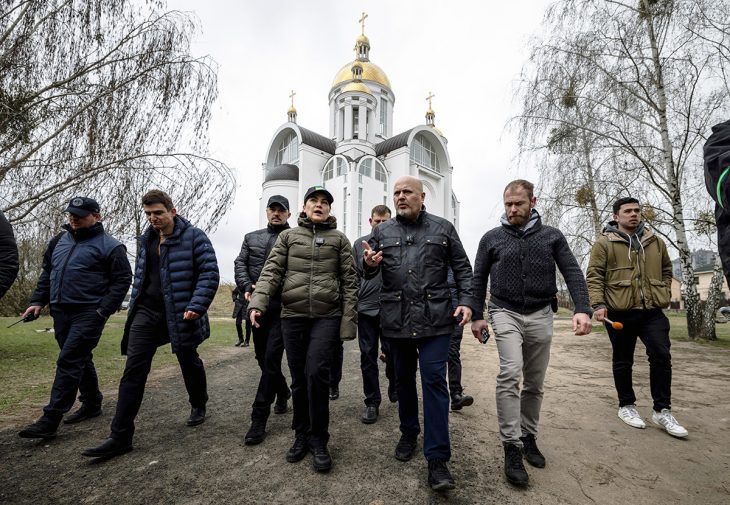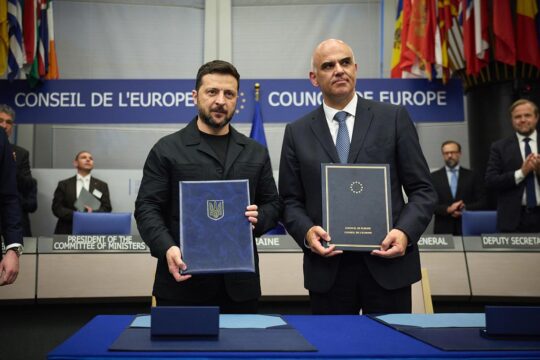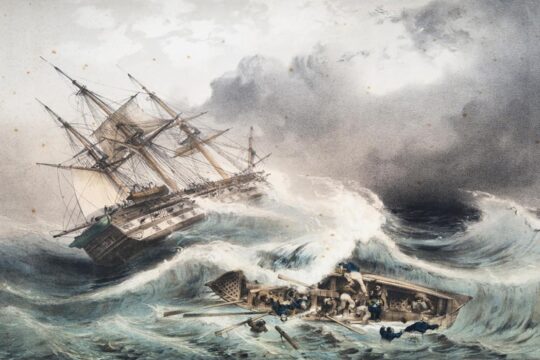JUSTICE INFO: What’s your first reaction to the ICC prosecutor's move?
Nadia Volkova, Ukrainian Legal Advisory Group: “It's probably the first concrete step that's been taken ever since the conflict started back in 2014. It's very strong and powerful, but also, quite daring.”
Astrid Reisinger Coracini, Salzburg Law School: “It’s a bold move to start right at the top. It’s a symbolic move to centre the first case around the unlawful and criminal deportation or transfer of children. It highlights children as one of the most vulnerable groups during armed conflict, and it also highlights the ‘russification’ of Ukraine as one of the motives behind the aggression against Ukraine. It’s a solid move from a legal point of view. The unlawful deportation or transfer of a protected person is a grave breach of the fourth Geneva Convention, to which both Russia and Ukraine are parties. With evidence provided from Ukraine, publicly available Russian legislation, and a TV interview that confirms Putin’s knowledge, the Prosecutor is expected to have built a strong case. Regarding the circumstantial elements, the Prosecutor does not leave solid ground: he remains within the confines of war crimes and does not invoke crimes against humanity, let alone allegations of genocide.”
Patryk Labuda, University of Zurich: “It is a ground-breaking event with global repercussions. It is impossible to fully understand what impact this will have on international criminal law but also international affairs more generally. It is akin to a 'Nuremberg moment' for the ICC.”
Geoffrey Lugano, Kenyatta University: “The majority of the first reactions were from western states. Most African states, and much of the Global South, have been indifferent. Perhaps this is linked to the various countries' proximity to the Russia/Ukraine war. Africa and the rest of the Global South are distant from the war, while most western states, that are geographically and culturally close to Ukraine, have been issuing statements in support of the Office of the Prosecutor's move.”
Angela Mudukuti, international lawyer: “This entire situation with Ukraine shows how swiftly the international community, the ICC and states can act when they feel compelled to. This has really highlighted the potential and the need for other situations to be treated with the same vigour, enthusiasm, resource dedication and commitment to bringing perpetrators to justice.”
Mark Kersten, University of the Fraser Valley: “It is an important and unprecedented move. There will be many people, like myself, who see the symbolism of the move as being something that resonates greatly. Eastern Europe has been regularly brutalized by Soviet and Russian governments for over a century. My own great-grandfather was murdered by the Soviets in Katyn [in April-May 1940, about 22,000 Polish military officers were executed by the Soviet secret police, later found in the Katyn forest]. I would never have thought that a Polish citizen and judge at the International Criminal Court [Piotr Hofmański, the current president of the ICC is from Poland] would issue an arrest warrant charging a Russian leader with war crimes. It is remarkable and meaningful. At the same time, for the ICC, it’s a rather significant gamble. No one is under any impression that this warrant will somehow magically be enforced tomorrow. When he was running for Prosecutor and when he started his tenure, chief Prosecutor Karim Khan repeatedly stated that he would focus on being “pragmatic” and getting results. It was for that reason that he “de-prioritized” his investigation into alleged U.S. atrocities in Afghanistan. He insisted that he wouldn’t turn the ICC into an NGO. Yet with the warrant against Putin, it seems likely to be more valuable in expressive terms than in actually producing accountability, at least for the time being. I am very curious about what this development says about the Prosecutor’s thinking and the strategic decision-making of his Office.”
What does it say about how the ICC Office of the Prosecutor is positioning itself in relation to the Ukraine/Russia conflict?
Astrid Reisinger Coracini: “This is only the first case coming out of the situation in Ukraine. It highlights a portion of the conflict that has caused particular distress. The purported second case on the destruction of civilian infrastructure will draw a broader picture of the plight of the Ukrainian population and Russian warfare more generally, which has not for the first time blatantly disregarded the rules of international humanitarian law.”
Patryk Labuda: “It suggests that the ICC wants to play an active part in addressing this war and the numerous crimes committed in full public view. We see a rather forward leaning posture from the ICC Prosecutor, which will surely be contrasted with the slower pace of other investigations - both by him and his predecessors.”
Geoffrey Lugano: “Much of the world sees Russia as the aggressor in this conflict (going by the votes in the UN General Assembly), and the indictments of top Russian officials, and not any from Ukraine, affirms this position.”
Mark Kersten: “We still don’t fully understand what the effects of pursuing international criminal law is on conflict and peace processes. Some people, like the current President of the Assembly of States Parties to the ICC, has helpfully said just this: we don’t know. Anyone who says otherwise is being dishonest or naïve. What is interesting about the ICC’s investigation and now the two warrants for Russian authorities is that the Prosecutor seems to not be hesitating about intervening in an active war. He’s jumped into the deep end from day one. Perhaps that’s because of the amount of support he’s received and the fact that states interesting in Ukraine winning the war have put pressure on him to act, and act quickly. It will no doubt complicate any peace process, but it is too early to speculate about how it will do so, especially given that there’s no meaningful prospects for negotiations right now.”
Owiso Owiso, international lawyer: “Karim Khan is on record arguing against a multiplicity of accountability efforts [in Ukraine]. By this move, I suppose the Office of the Prosecutor is positioning itself as the primary criminal accountability actor in this situation. Whether that is necessarily a good thing is a totally different matter.”
Could we see further charges, including genocide?
Melanie O Brien, University of Western Australia: “I've been sceptical all along, when people have been asking whether genocide is taking place by Russia against Ukraine. But the one thing that I've always said is that the forcible transfer of children is key. If we're looking at genocide charges, that's what we should be looking at first. So I'm intrigued that the first charges they brought are related to that same conduct, but under war crime. If you look at the context of this, at the numbers of children transferred, at the way they're doing it, they are deliberately, specifically saying we want to “Russianise” these children. The children are being adopted into families and then being sent for education to “Russianise” them, to make them pro-Russian, to make them want to be Russian. That would be a very, very good argument for the prosecutor for bringing the charge of forcible transfer of children as genocide. I think you could argue that the genocidal special intent exists in this context, namely the intent to destroy the group. In this case, it would be a national group because they don't want these children to be Ukrainian and they want them to become Russian in every way.”
Does it change the perception of the ICC globally that it charges the head of state of one of the permanent members of the UN Security Council, the “P5” states?
Astrid Reisinger Coracini: “The veto right of the permanent members of the Security Council allowing them to evade accountability under chapter VII of the UN Charter is a core imbalance of contemporary international law. If a P5 state official can be held individually criminally responsible despite this privilege, it is a major step toward accountability.”
Patryk Labuda: “Like everything else in international criminal law, one can assess this from two angles: as the glass being half-full or half-empty. There is a strong argument to be made that this is a huge break with the past. Imperial powers like Russia usually benefit from de facto immunity, as we have seen for over a decade in the ICC’s Georgia and pre-2022 Ukraine inquiries. But there is another way of looking at it, namely that the ICC and other tribunals only act when Western powers throw their weight behind investigations. While this narrative will resonate with ICC critics who are unsatisfied with progress in other investigations, it is arguably incomplete as it ignores the ground-breaking nature of the Prosecutor's actions.”
Angela Mudukuti: “On the one hand it sends a very strong message to victims and survivors; on the other hand we have to be cognizant of the expectations that may be created because this could potentially bring to the fore the problem we know the international system has which is that these arrest warrants can only be enforced if states cooperate with the ICC. We know from the situation with the former Sudanese president Omar al Bashir that this has been difficult in the past.”
Mark Kersten: “For many folks, the P5 is a short-hand for Western states that have managed to avoid ICC accountability. My hope is that certain communities and states – perhaps especially those in the “Global South” – which may not be fussed about the ICC but have always opposed the uneven distribution of power in international law and international relations will see the Prosecutor’s warrants as a viable and meaningful challenge to the Security Council’s hegemony.”
Owiso Owiso: “It does change perception in as far as it proves that if the Office of the Prosecutor is really minded to, it can pursue the P5. At the same time, if it does not make any movement as regards Afghanistan (specifically on alleged crimes by US forces there) and Palestine soon, the perception of bias is likely to persist or even be more pronounced as this move against Putin will likely be viewed as ‘proof’ yet again that the ICC’s enthusiasm is only limited to those 'safe' situations that do not directly involve Western Europe and Others Group and their allies. If there’s fast movement as regards Afghanistan and Palestine, then the Office of the Prosecutor will vindicate itself. If not, then this will do more damage than good for its reputation. Where this speed, enthusiasm has been for other equally urgent and horrific situations such as Palestine, Northern Nigeria, and Afghanistan? This is precisely the kind of speed and enthusiasm that the Office of the Prosecutor should adopt across the board. Otherwise, it tells a different, unpleasant story about how it prioritises situations and victims.”
Does the move deepen perceptions that this prosecutor's priorities seem to be linked to political interests of the Global North?
Patryk Labuda: “Analysing developments in Ukraine through the lens of 'Global North' versus 'Global South' assumes that Ukraine and other post-Soviet countries from the former 'Second World' are full members of the Global North. This is a reductionist narrative that ignores Ukraine's place in the global order. If Ukraine were a member of NATO or the EU, we wouldn't have this war. The crimes are happening because Ukraine is not part of the Western alliance, many analysts seem to not understand that.”
Geoffrey Lugano: “The Russia/Ukraine conflict is very recent, and yet the ICC has already conducted investigations and issued warrants of arrest. The Office of the Prosecutor's discretion cannot be divorced from the consensus among western states that Russia is the aggressor, and that the ICC, or any other form of criminal tribunal, should prosecute the aggression. Compare this to the US/western invasion of Iraq and Afghanistan that are over a decade old: The ICC has been very slow to act, and when the Office of the Prosecutor tried to do so (with regards to the situation in Afghanistan), we did not see much of western support. Again, the new prosecutor, Khan, in September 2021, issued a statement deprioritizing the atrocities that were allegedly committed by Americans, and yet we didn't see a similar pattern of condemning such blatant selectivity. What about Israel, one of the topmost western allies in the Middle East? Not much comes from the West in terms of condemning and prosecuting state-sponsored atrocities in occupied Palestinian territories.”
Angela Mudukuti: “We know from the past that the ICC has effectively shied away from dealing with crimes committed by the Global North whether you consider it justified or not. I'm talking particularly about America's conduct in Afghanistan and also British conduct in Iraq. So there is a political dynamic there that has to be monitored.”
What impact may this have on other situations the ICC is investigating?
Patryk Labuda: “It is hard to tell. Karim Khan has said he will use the additional resources he has received to pursue investigations not only in Ukraine but also in other countries. This is welcome news, but we have not yet seen any evidence of that. He recently closed investigations in Central African Republic and Georgia, which was pretty controversial. The elephant in the room is of course Palestine/Israel. The longer the Prosecutor remains silent on Palestine, the more awkward his position is going to be. This is the other most pressing issue facing the Prosecutor, at least in the court of public opinion. He needs to address it.”
Geoffrey Lugano: “Putin's indictment will embolden defiance among non-compliant states, such as the Philippines, Israel, USA, and other dictatorships that might draw on Russia's legal arguments against the indictment. Such measures of legal defiance will carry lots of weight coming from a P5 member.”
Angela Mudukuti: “This has a severe impact on other situations that the prosecutor is investigating because we've seen a lot of swift movement with Ukraine that we have not seen in other situations. We also see that there's a lot more information coming out about the investigation in Ukraine than we see in other situations. So this will put pressure on the prosecutor to churn out results in the other preliminary examinations and also to perhaps be more communicative on those points. There will be lots of activists, civil society organizations survivors and victims asking: well, what about our situation and where is the progress on that? I do think that this is going to increase the pressure.”
Melanie O Brien: “They've been so quick to move on Ukraine. What about the other places? I use Myanmar as an example because it is an ongoing issue for the victims and survivors who are in limbo. Why are they not important enough to merit multiple visits? For me, it's a double-edged sword in that regard.”
By taking it right up to the top, right up to Putin, does that make a difference to the debate about the possibility of a tribunal on aggression?
Nadia Volkova: “I certainly hope so. I think that Karim Khan has demonstrated that there is no need to create additional entities with the purpose of prosecuting political leadership. And so the focus should be different.”
Owiso Owiso: “This move has poured lots of cold water on that debate. However, I don’t expect that debate to die out completely, and it shouldn’t. The crime of aggression in this situation is still outside the ICC’s purview, so an aggression tribunal should still very much be on the table. If anything, the Office of the Prosecutor’s move should embolden Ukraine to engage partners (particularly the Council of Europe) more aggressively in discussions on an aggression tribunal.”







